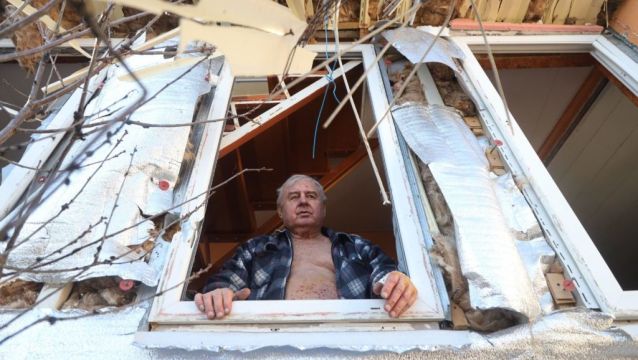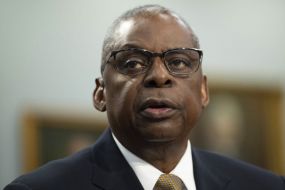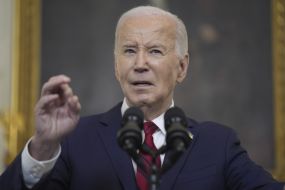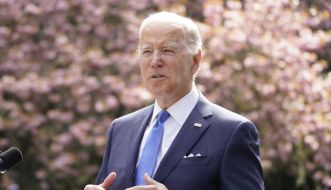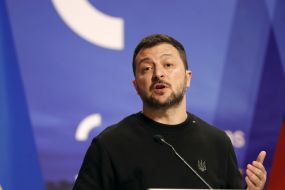What you need to know right now:
- Ukraine defied a Russian demand that its forces lay down arms before dawn on Monday in Mariupol, where hundreds of thousands of civilians have been trapped in a city under siege and already laid to waste by Russian bombardment.
- Russia's assault on Ukraine, now in its fourth week, has stalled along most fronts, failing to seize a single major Ukrainian city much less capture the capital Kyiv or swiftly topple the government of president Volodymyr Zelenskiy. But Russian shelling and missiles have caused devastation in built-up residential areas.
- Authorities in Odessa accused Russian forces of carrying out a strike on residential buildings in the city's outskirts early on Monday, the first such attack on the Ukrainian Black Sea port. They said a fire erupted, but there were no casualties.
- Russian air forces hit a Ukrainian army military facility in the Rivne region with cruise missiles, Russia's defence ministry said on Monday.
- Ukraine described the situation in Mariupol on Monday as "very difficult" and said it had been unable to establish a new safe corridor to evacuate civilians from the beleaguered city.
- Ten million people have been displaced by the conflict, including nearly 3.5 million who have fled abroad, according to the UN refugee agency.
- European Union leaders began a week of intense diplomacy aimed at agreeing a fifth round of tough sanctions against Russia, including a possible embargo against its lucrative oil and gas sector called for by some eastern member states.
- The Kremlin said on Monday peace talks between Russia and Ukraine had not yet made any significant progress.
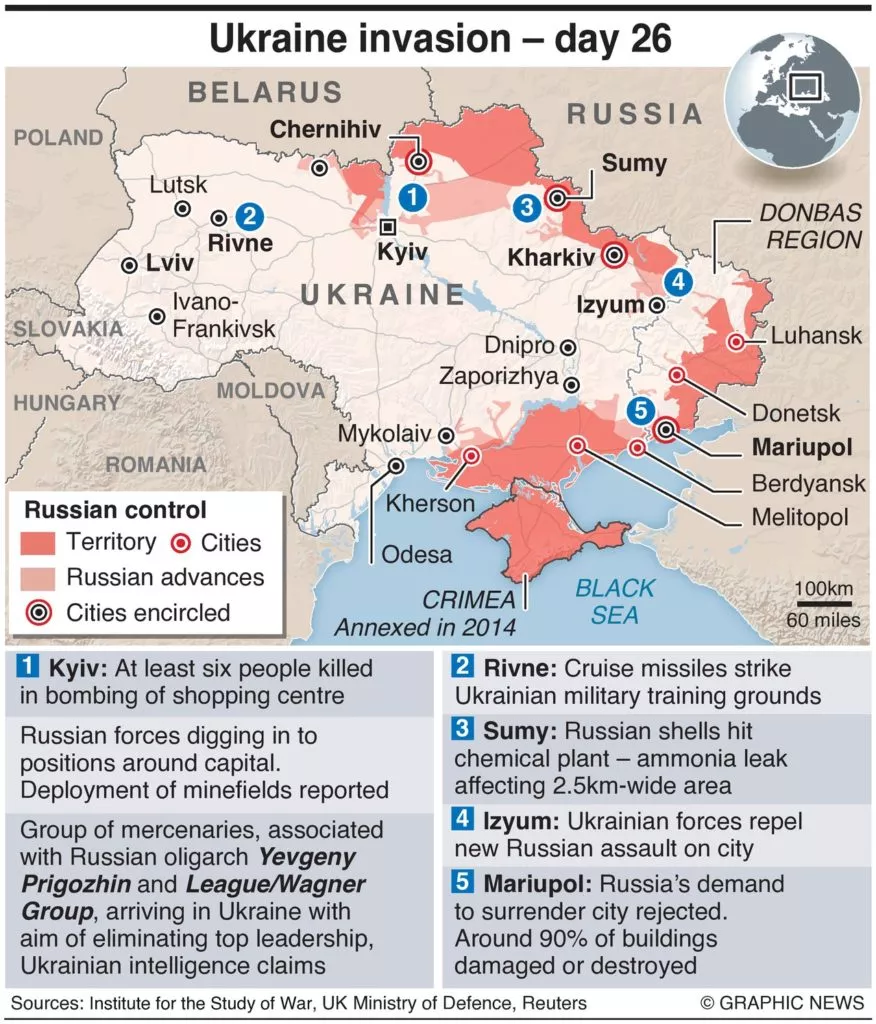
9.58pm: A meeting with Russian president Vladimir Putin is necessary to determine the country's position on ending the war he launched in Ukraine, Interfax Ukraine news agency quoted Ukrainian president Volodymyr Zelenskiy as saying in a television interview.
Mr Zelenskiy, interviewed by public television channels from European countries, also said it would not be possible to take a decision at such a meeting on what should be done with occupied territories in Ukraine.
8.45pm: The Pentagon has accused Russian forces of committing war crimes in Ukraine and said it would help gather evidence of them, as it accused the Kremlin of carrying out indiscriminate attacks as part of an intentional strategy in the conflict.
"We certainly see clear evidence that Russian forces are committing war crimes and we are helping with the collecting of evidence of that," Pentagon spokesman John Kirby told a news briefing.
"But there are investigative processes that are going to go on, and we're going to let that happen. We're going to contribute to that investigative process. As for what would come out of that, that's not a decision that the Pentagon leadership would make," Mr Kirby added.
7.36pm: Ukrainian president Volodymyr Zelenskiy said any compromises agreed with Russia to end the war would need to be voted on by Ukrainians in a referendum.
"The people will have to speak up and respond to this or that form of compromise. And what they (the compromises) will be is the subject of our talks and understanding between Ukraine and Russia," he said in an interview published by Ukrainian public broadcasting company Suspilne.
Issues that could be raised in any referendum could concern territories occupied by Russian forces, including Crimea, or security guarantees offered to Ukraine by countries in lieu of Nato membership, he said.
6.51pm: The European Union is ready to impose additional sanctions on Russia over the invasion of Ukraine, the bloc's foreign policy chief Josep Borrell has said.
"Restrictive measures continue constituting an important part of our approach, and we are ready to take further (measures) with our partners," he told reporters after a meeting of EU foreign ministers in Brussels.
Elsewhere, the US has warned that there is "evolving intelligence" that the Russian government was exploring options for potential cyberattacks, according to a statement from the White House.
"I urge our private sector partners to harden your cyber defences immediately," US president Joe Biden said in the statement, adding everyone needed "to do their part to meet one of the defining threats of our time."
5.38pm: Ukrainian prosecutors have opened an investigation into the alleged forceful seizure by Russian troops of five ships carrying Ukrainian grain in the port of Berdiansk, the general prosecutor's office said on Monday.
The criminal case is being handled by prosecutors in southern Zaporizhzhia region, it said. Russia did not immediately comment on the statement by the general prosector's office.
4.36pm: The mayor of Kyiv has said a new, longer curfew was being introduced in the Ukrainian capital because the authorities expect further shelling by Russian forces.
Mayor Vitali Klitschko had earlier announced a "reinforced curfew" from 8pm (6pm Irish time) until 7am on Wednesday, with parts of the city coming under repeated fire from Russian forces.
The extension to the curfew comes as Ukrainian president Volodymyr Zelenskiy said his country would never bow to ultimatums from Russia and cities including Kyiv, Mariupol and Kharkiv would not accept Russian occupation.
"We have an ultimatum with points in it. 'Follow it and then we will end the war'," Mr Zelenskiy said in an interview published by Ukrainian public broadcasting company Suspilne. "Ukraine cannot fulfil the ultimatum," he added.
Meanwhile, British prime minister Boris Johnson agreed in a call with the European Council's president Charles Michel to continue close cooperation and a united UK-EU response to Russia's invasion of Ukraine, Mr Johnson's office has confirmed.
3.45pm: The UN migration agency has said nearly 6.5 million people had been displaced in Ukraine as a direct result of the war, citing a study it conducted between March 9th-16th.
"The scale of human suffering and forced displacement due to the war far exceeds any worst-case scenario planning," said António Vitorino, director general of the International Organisation for Migration. He said IOM teams had been providing aid to thousands of people, but those in severely affected areas remained out of reach.
2.55pm: The United States cannot independently confirm or refute a Russian claim over the weekend that it fired hypersonic missiles at a Ukrainian target, but the use of such a weapon makes little sense from a military perspective, a senior US defense official said on Monday.
"It could be that they're trying to send a message to the West," the official said on condition of anonymity. From a military perspective, the official added, "there's just not a lot of practicality about it."
Meanwhile, Ukraine's defence minister Oleksii Reznikov has accused the Kremlin of conducting state terrorism, warning Russia will go on to attack other countries.
Speaking alongside British defence minister Ben Wallace during a visit to London, Mr Reznikov said 150 Ukrainian children had been killed since Russia invaded, with over 400 schools and kindergartens and more than 110 hospitals destroyed.
"This is a state terrorism. That is why (the) Kremlin must be stopped, because it will go further. It will attack other countries," Mr Reznikov said, but did not cite any evidence to support his assertion. Russia denies targeting civilians.
1.55pm: Ukraine, a major global wheat exporter, is likely to export just 200,000 tonnes of wheat from March to June due to its Black Sea ports being blocked by the Russian invasion, analyst APK-Inform said on Monday.
The consultancy said in a report that 2021/22 July-June wheat exports would not exceed 18.3 million tonnes, while ending stocks will reach 5.9 million tonnes.
Ukraine exported 18.1 million tonnes of wheat from July 2021 to March 2022.
1.30pm: The UN human rights office (OHCHR) said on Monday it had recorded 2,421 civilian casualties in Ukraine - 925 killed and 1,496 injured - as of midnight on March 20th.
1.15pm: Hundreds of Ukrainians waited in front of Poland's national stadium to register for work permits on Monday as governments and businesses across Central Europe sought to help refugees who have fled Russia's invasion find jobs and school places.
Poland has taken in the largest number of refugees, some 2.1 million, since the start of the war. Its pre-war Ukrainian community of around 1.5 million had already represented the region's largest.
1pm: All Ukrainian its ports on the Black Sea and Azov Sea remain temporarily closed to ships seeking to enter or exit, Ukraine's infrastructure ministry said on Monday.
Soon after Russia's invasion on February 24th, Ukraine's military suspended commercial shipping at its ports, stoking fear of supply disruption from leading grain and oilseeds exporters.
12.30pm: Russian and Ukrainian peace negotiators held a 90-minute video call on Monday and working groups will continue to meet throughout the day, a member of the Ukrainian delegation said.
"Today we are working the whole day," Ukrainian delegate and lawmaker David Arakhamia was quoted as saying by Ukrainian media.
12.10pm: Several hundred mines have drifted into the Black Sea after breaking off from cables near Ukrainian ports, Russia's main intelligence agency and shipping market participants said.
The Black Sea is a major shipping artery for grain, oil and oil products.
11.45am: Russian deputy prime minister Alexander Novak said on Monday that oil prices could reach $300 (€271) a barrel if Russian crude was shunned by the West, although he said that was unlikely, TASS news agency reported.
Novak also said it was impossible for Europe to refuse Russian oil and gas for now.
11.35am: Russia's deputy prime minister has said that it is currently impossible for Europe to refuse Russian gas.
11.20am: Ukraine's state-run gas transmission system operator said on Monday said it had full control of the network.
"The company retains operational and technological control," it said in a statement.
11.05am: Russian president Vladimir Putin is committing war crimes in Ukraine and more sanctions are the only way to stop him, Czech prime minister Petr Fiala said on Monday.
"The Russian army devastated Ukraine's Mariupol. The whole world sees that Vladimir Putin is committing war crimes and innocent people are dying because of his war," Fiala said on Twitter.
"We must continue to push for a clear and united approach to Russia and more sanctions, it is the only way to stop Putin."
Ruská armáda zdevastovala ukrajinský Mariupol. Celý svět vidí, že Vladimir Putin se dopouští válečných zločinů a že kvůli jeho válce umírají nevinní lidé.
Musíme nadále prosazovat jasný a jednotný postup vůči Rusku a další sankce, je to jediná cesta, jak Putina zastavit.— Petr Fiala (@P_Fiala) March 21, 2022
10.45am: The Kremlin said on Monday Europe would be hit hard in the event of an embargo on Russian oil, striking the continent's energy balance, but would not affect the United States.
Some European Union foreign ministers are pushing for an oil embargo as part of a possible fifth round of sanctions against Russia, in an effort to punish Moscow over events in Ukraine.
10.35am: Authorities in Odesa accused Russian forces of carrying out a strike on residential buildings in the outskirts of the Ukrainian city early on Monday, the first such attack on the Black Sea port city.
The city council said there were no casualties although the strike caused a fire. "These are residential buildings where peaceful people live," mayor Gennadiy Trukhanov was quoted as saying. Russia denies targeting civilians.
10.15am: A Russian-backed separatist leader in eastern Ukraine said on Monday it would take more than a week to take control of the besieged Ukrainian port city of Mariupol, the Russian news agency Interfax reported.
"I am not so optimistic that two or three days or even a week will close the issue. Unfortunately, no, the city is big," Denis Pushilin, head of the so-called Donetsk People's Republic, said, according to the report.
10am: The mayor of Kyiv on Monday announced a "reinforced curfew" in the Ukrainian capital from 8pm (6pm GMT) until 7am on Wednesday.
Mayor Vitali Klitschko said shops, pharmacies and petrol stations would not open on Tuesday. Parts of the city have come under fire repeatedly from Russian forces.
"I ask everyone to stay at home - or in shelters when the alarm sounds," he said.
9.45am: Ukraine described the situation in Mariupol on Monday as "very difficult" and said it had been unable to establish a new safe corridor to evacuate civilians from the besieged city after it defied a Russian ultimatum to surrender.
9.30am: Minister for the Environment, Climate and Communications and Transport Eamon Ryan has said that Ireland needs to do more to assist Ukraine.
One of the best ways to do that would be to stop spending hundreds of millions on Russian gas and oil, he told RTÉ radio’s Morning Ireland.
Ireland will push for stronger sanctions “to put an end to the Putin regime” and one of the best ways to do that was to challenge the economic strength of Russia by stopping the sale of fuels like gas and oil.
9.05am: The Kremlin has said that there is still no basis for a possible meeting between Putin and Ukraine's president Volodymyr Zelenskiy.
8.45am: European Union foreign ministers will discuss slapping more sanctions on Russia, including sanctions on the country's energy and oil sector, the bloc's foreign policy chief Josep Borrell said on Monday.
"The ministers will discuss that," he told reporters ahead of an EU foreign ministers meeting in Brussels, responding to a question whether measures against Russian oil exports would be talked about.
"From an Irish perspective we are open to that," Minister for Foreign Affairs Simon Coveney said.
8.30am: Lithuania's foreign minister has said that countries who help Russia circumvent sanctions should know they can be sanctioned as well.
8.15am: The Ukrainian port city of Odesa is Russia’s next “logical” target, a former commander of UK Joint Forces Command has said.
Richard Barrons told the Today programme on BBC Radio 4: “I think they will now turn to Odesa because that is logically the next place to go in the south and there seem to be more ships in the Black Sea pointing at it.”
He added that taking Odesa would also isolate Ukraine’s economy from the Black Sea.
8am: Russian air forces hit a Ukrainian army military facility in Rivne Region with cruise missiles, Russia's defence ministry said on Monday.
"High-precision air-launched cruise missiles have struck a training centre for foreign mercenaries and Ukrainian nationalist formations," defence ministry spokesman Igor Konashenkov said.
7.45am: Agreement has been reached on creating eight humanitarian corridors to evacuate civilians from besieged towns and cities on Monday, but the city of Mariupol is not among them, Ukrainian deputy prime minister Iryna Vereshchuk said.
She said efforts to reach Mariupol with humanitarian supplies continued to fail.
7.30am: The war between Ukraine and Russia, two of the world's top crop producers, could lead to a food crisis "on the global" scale, French farming minister Julien Denormandie said in Brussels on Monday ahead of a EU agriculture meeting.
EU ministers will discuss the food situation with their Ukrainian counterpart in a video call, he added.
A World Food Programme (WFP) official said on Friday that food supply chains in Ukraine were collapsing, with key infrastructure such as bridges and trains destroyed by bombs and many grocery stores and warehouses empty.
6.50am: Russian forces advancing on Kyiv from the north-east have stalled and the bulk of its forces remain more than 25 kilometres from the centre of the city, British military intelligence said on Monday.
"Heavy fighting continues north of Kyiv," the ministry of defence said.
"Forces advancing from the direction of Hostomel to the north-west have been repulsed by fierce Ukrainian resistance."
Ukraine on Monday rejected Russian calls to surrender the port city of Mariupol, where residents are besieged with little food, water and power in a humanitarian crisis that is increasing pressure on European leaders to toughen sanctions on Moscow.
Ukraine's government defiantly rejected Russian calls for Ukrainian forces in Mariupol to lay down their arms in exchange for safe passage out of the city and humanitarian corridors to be opened from 10am Moscow time (7am GMT) on Monday.
"There can be no question of any surrender, laying down of arms," the Ukrainska Pravda news portal cited Ukraine's deputy prime minister Iryna Vereshchuk as saying.
"We have already informed the Russian side about this."
Mariupol has suffered some of the heaviest bombardments since Russia invaded Ukraine on February 24th Many of its 400,000 residents remain trapped as fighting rages on the streets around them.
Vereshchuk said over 7,000 people were evacuated from Ukrainian cities through humanitarian corridors on Sunday, more than half from Mariupol. She said the government planned to send nearly 50 buses there on Monday for further evacuations.
Russia and Ukraine have made agreements throughout the war on humanitarian corridors to evacuate civilians, but have accused each other of frequent violations of those.
The crisis in Mariupol and other devastated Ukrainian cities is likely to feature heavily in discussions between European Union leaders this week as they consider imposing tougher sanctions on Russia including an oil embargo.
EU governments will take up the discussion among foreign ministers on Monday, before US president Joe Biden arrives in Brussels on Thursday for summits with Nato's 30 allies, as well as the EU and in a G7 format including Japan.
Diplomats told Reuters that Baltic countries including Lithuania are pushing for an embargo as the next logical step, while Germany is warning against acting too quickly because of already high energy prices in Europe.
In his latest appeal for help from abroad, Ukrainian president Volodymyr Zelenskiy addressed the Israeli parliament by video link on Sunday and questioned Israel's reluctance to sell its Iron Dome missile defence system to Ukraine.
"Everybody knows that your missile defence systems are the best ... and that you can definitely help our people, save the lives of Ukrainians, of Ukrainian Jews," said Zelenskiy, who is of Jewish heritage.
Zelenskiy also welcomed the mediation efforts of Israeli prime minister Naftali Bennett, who has held numerous calls with him and Russian president Vladimir Putin.
He said in his daily video address to Ukrainians that "sooner or later we will begin to have talks with Russia, possibly in Jerusalem".
Mariupol's council said on Telegram that several thousand residents had been "deported" to Russia over the past week. Russian news agencies said buses had carried hundreds of refugees from Mariupol to Russia in recent days.
US ambassador to the United Nations Linda Thomas-Greenfield told CNN the deportation accounts were "disturbing" and "unconscionable" if true, but said Washington had not yet confirmed them.
Reuters could not independently verify the claims. Russia denies targeting civilians.
Greece's consul general in Mariupol, the last EU diplomat to evacuate the city, said it was joining the ranks of places known for having been destroyed in wars.
"What I saw, I hope no one will ever see," he said.
Kyiv and Moscow reported some progress last week toward a political formula that would guarantee Ukraine's security, while keeping it outside Nato - a key Russian demand - though each side accused the other of dragging things out.
Few advances
Capturing Mariupol would help Russian forces secure a land corridor to the Crimea peninsula that Moscow annexed from Ukraine in 2014.
Putin says Russia's "special operation" is aimed at disarming Ukraine and rooting out dangerous nationalists. Western nations call it an aggressive war of choice and have imposed punishing sanctions aimed at crippling Russia's economy.
Ukraine and its Western backers say Russian ground forces have made few advances in the last week, concentrating instead on artillery and missile strikes.
Zelenskiy's adviser Oleksiy Arestovych said on Sunday there had been a relative lull over the past 24 hours, with "practically no rocket strikes on cities". He said front lines were "practically frozen".
Three civilians were killed and five were injured as a result of Russian shelling on Sunday in the east of the country, said Pavel Kirilenko, head of the Donetsk regional military administration. In the Kharkiv region one person was killed and one injured, and in Luhansk region two were killed and one injured.
In the capital Kyiv, mayor Vitali Klitschko reported several explosions in Podil district and said rescue teams were putting out a large fire at the shopping centre. He said at least one person was killed.
Reuters was not able to verify the reports.
The UN human rights office said at least 902 civilians had been killed as of Saturday, though the real toll was probably much higher.
A five km area around a chemicals plant in the besieged northeastern city of Sumy the plant was hazardous due to an ammonia leak, Sumy regional governor Dmytro Zhyvytskyy said. It was not known what caused the leak.
About 10 million Ukrainians had been displaced, including some 3.4 million who have fled to neighbouring countries such as Poland, the UN refugee agency said.
In the southern city of Kherson, video seen by Reuters showed dozens of protesters, some wrapped in Ukraine's blue-and-yellow flag, chanting "Go home" in Russian at two military vehicles with Russian markings. The vehicles turned and left.
"I want the war to be over, I want them (Russian forces) to leave Ukraine in peace," said Margarita Morozova, 87, who survived Nazi Germany's siege of Leningrad in World War Two and has lived in Kharkiv, eastern Ukraine, for the past 60 years. - Reuters
